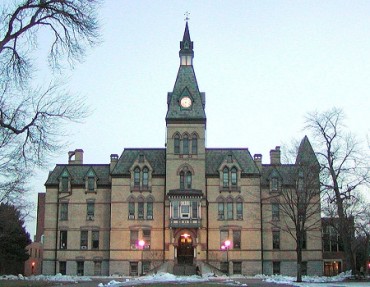
An academic community is impossible without academic freedom
Though campus administrators may wish that inclusion and free speech are always compatible, the two values will often be in tension — and academic freedom should win.
I endorse this view, expressed today in a Chronicle of Higher Education essay by Amna Khalid and Jeffrey Snyder, both professors at Carleton College in Minnesota.
Unfortunately, the false compatibility of inclusion and academic freedom is an “article of faith” for elite campus administrators. This belief is exemplified in a 2018 report from the Harvard University Task Force on Inclusion and Belonging, Khalid and Snyder wrote.
The “values of academic freedom and inclusion and belonging provide each other with synergistic and mutual reinforcement,” and the two should not be seen as “antagonistic goals,” according to the Harvard report.
In January, I wrote a column disagreeing with Eboo Patel’s own essay in The Chronicle in which he argued that faith issues at universities could be resolved by DEI administrators trained as experts in religion. He cited the firing of an instructor at Minnesota’s Hamline University (pictured) for showing an image of the Prophet Muhammad as an instance where the student could have learned a diversity lesson from the Office of Inclusive Excellence.
I wrote then that the Hamline University case forced the university to choose: deference to conservative Islam or freedom to teach art history. The Muslim writers who defended the professor, including Khalid, were correct that the student did not speak for all members of her faith. But she did speak out of Muslim belief.
When the Hamline faculty voted 71-12, with nine absentions, to support a statement calling for the resignation of President Fayneese Miller over her handling of the Muslim student’s complaint, they were casting a vote for academic freedom over religious inclusion and student “belonging” regardless of cost, and they were right to do so.
Khalid and Snyder seem to concur in their essay today.
“In many ways the Hamline debacle is the ideal case study for laying bare the unavoidable tensions between academic freedom and the DEI Inc. approach to inclusion,” they wrote.
“In December, President Miller and David Everett sent an open letter to the campus asserting that ‘appreciation of religious and other differences should supersede when we know that what we teach will cause harm,’ and in particular ‘respect for the observant Muslim students in that classroom should have superseded academic freedom.'”
“Miller’s comments at least had the virtue of offering an honest diagnosis of the tension between academic freedom and inclusion,” Khalid and Snyder said.
“With institutions promoting such an expansive definition of ‘inclusion,’ we shouldn’t be surprised when they become ensnared in their own rhetoric and policies,” they said. “How will DEI administrators respond when a Chinese national complains that a political-science discussion about the persecution of Uyghurs is ‘harmful anti-Chinese propaganda’? Or when a Christian evangelical says her faith was insulted in a contemporary art class after seeing a Robert Mapplethorpe photograph of two men kissing? The permutations are endless and, for professors who teach sensitive or controversial material, alarming.”
Nonetheless, the maintenance of high academic standards is impossible without academic freedom. As I wrote in January, secular universities must commit to basic norms that include the right of professors to do their jobs. Scholars have a professional obligation to adhere to their own disciplinary standards of pedagogy and evidence. If adherence to those standards results in someone feeling like they don’t belong — because a portrait of a religious figure offends their faith, or a biology lesson on sexual dimorphism offends their ideology — the standards must prevail.
If they do not, we are one step further towards supplanting college as an educational institution with the DEI, Inc. model, in which “education is a product, students are consumers, and campus diversity is a customer-service issue that needs to be administered from the top down,” as Khalid and Snyder wrote.
Thankfully, Hamline’s faculty members signaled they valued academic freedom more highly than student comfort. When the time comes to choose, let’s hope other faculty do likewise.
MORE: Hamline University sued for firing professor who showed Prophet Muhammad images
IMAGE: Hamline University
Like The College Fix on Facebook / Follow us on Twitter






Please join the conversation about our stories on Facebook, Twitter, Instagram, Reddit, MeWe, Rumble, Gab, Minds and Gettr.